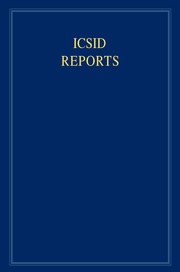No CrossRef data available.
Article contents
Unión Fenosa Gas, S.A. v. Arab Republic of Egypt
Published online by Cambridge University Press: 06 July 2022
Abstract
Jurisdiction – Investment – Contract – Shares – ICSID Convention, Article 25(1) – Salini test – Whether contract, execution, amendment and performance were an investment under a BIT – Whether shares in a local company were an investment under a BIT – Whether the investments met the guidance provided by the Salini test
Admissibility – Parallel proceedings – Res judicata – Bad faith – Claim-splitting – Whether the claims were inadmissible because the investor’s subsidiary had pursued contractual claims in parallel arbitration proceedings
Procedure – Stay of proceedings – Parallel proceedings – Res judicata – Claim-splitting – Whether the tribunal had to stay the arbitration to await the result of parallel proceedings
Jurisdiction – Investment – Legality – Corruption – Lobbying – Evidence – Whether bribe by a subcontractor to officials affected the legality of the investment – Whether using personal connections for the benefit of the investor was corrupt – Whether paying generous fees to a local representative was evidence of corruption or legitimate lobbying
State responsibility – Attribution – ILC Articles on State Responsibility, Article 4 – State organ – State-owned entity – Whether a national oil company or its subsidiary were organs of the State
State responsibility – Attribution – ILC Articles on State Responsibility, Article 5 – Governmental authority – State-owned entity – Whether a national oil company or its subsidiary were empowered to exercise governmental authority
State responsibility – Attribution – ILC Articles on State Responsibility, Article 8 – Direction or control – State-owned entity – Contract – Whether a national oil company or its subsidiary were directed or controlled by the State – Whether the decision to reduce the supply of natural gas contrary to contractual agreement was made under the direction or control of the State
State responsibility – Attribution – ILC Articles on State Responsibility, Article 11 – Conduct adopted by the State – State-owned entity – Contract – Whether the breach of contract by a national oil company or its subsidiary had been adopted by the State as its own conduct
Fair and equitable treatment – Customary international law – Legitimate expectation – Contract – Taxation – Specific assurance – Whether the standard of fair and equitable treatment was equivalent to the customary minimum standard – Whether legitimate expectations were protected by the customary minimum standard – Whether a contract between the investor and the subsidiary of a national oil company created a legitimate expectation – Whether a letter from a State official created a legitimate expectation – Whether the expectation was relied upon – Whether the expectation was defeated – Whether non-payment under a contract defeated a legitimate expectation – Whether revocation of tax-free status defeated a legitimate expectation
State responsibility – State of necessity – ILC Articles on State Responsibility, Article 25 – Only way – Essential interest – Contribution – Civil unrest – Economic crisis – Contract – Whether non-supply of natural gas was the only way to safeguard an essential interest – Whether maintenance of public safety was the basis for non-supply of natural gas – Whether natural gas shortage was an essential interest – Whether the State contributed to the situation of necessity
Remedies – Compensation – Quantum – Contract – Reduction – Mitigation – Interest – Whether the investor could claim more compensation than available under a contract – Whether the investor suffered loss – Whether the claim for compensation was excessively speculative – Whether lost cash flows were recoverable – Whether the investor suffered lost dividends – Whether compensation should be reduced to reflect lesser need for working capital and taxes – Whether the investor could have mitigated losses – Whether pre-award interest should be awarded – Whether post-award interest should be awarded
Costs – Costs follow the event – Legal fees – Arbitration costs – Whether the unsuccessful party was to pay the legal fees of the successful party – Whether the unsuccessful party was to pay the arbitration costs of the successful party
Keywords
- Type
- Case Report
- Information
- Copyright
- © Cambridge University Press 2022


